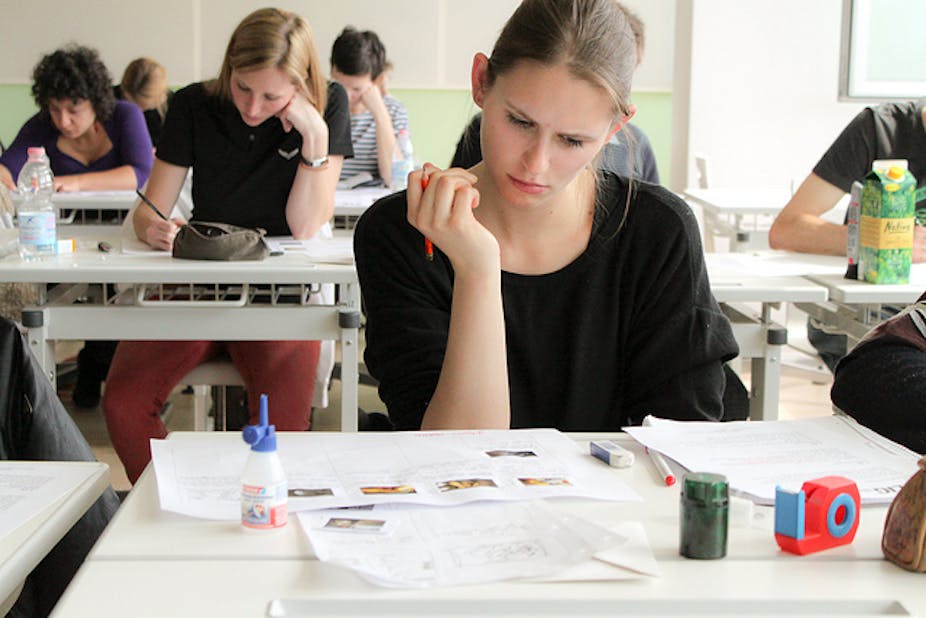In recent weeks, students across high school and university classrooms have been breathing sighs of relief. Exams are officially over, and celebrations have begun.
For many students, exams seem a necessary evil. Time-consuming yet inevitable. But are exams really necessary? And are they evil?
In 2011, Macquarie University was the first Australian university to debate the abolition of exams. No exams in any subject, at any year level. At the time it was suggested that exams fail to develop “questioning, self sufficient learners”. Critics also often argue that exams promote a superficial understanding of topics, and that they are inauthentic: that is, they fail to represent the kinds of things students will be asked to do “in the real world”.
However, this is taking a narrow view of the benefits of exams. Exams include many of the aspects we want from assessment.
What do we want from assessment?
Good assessment programs aim to provide a balanced, fair evaluation of each student. They achieve this in two ways. First, they use of a variety of strategies and tasks. This gives students multiple opportunities, in varying contexts, to demonstrate what they know and can do. It also enables teachers to be confident in the accuracy of their judgements about each student.
Second, tasks must be “fit for purpose”. Assuming a subject has a number of goals (knowledge to learn, skills to acquire), each task should be appropriate to the specific goal or goals it is assessing. This means that a task assessing base knowledge will look different to one assessing creativity.
Rather than abolishing exams, we should instead be asking what mix of assessment tasks is most appropriate for each subject. Where might exams fit? And what are their benefits?
Exams focus on breadth
In most disciplines, there are specific bodies of knowledge that students are expected to learn. Physics students might learn about thermodynamics, while history students might learn about the cold war. Exams enable us to accurately test students’ breadth of understanding of these topics.
Critics of exams often instead promote “deep”, “rich”, and “authentic” assessment tasks. These are typically project-based tasks that draw on students’ creativity and interest. For example, history students might be asked to choose and research a historical character in depth. Business studies students might be asked to design the pitch for a new business seeking venture capital.
These tasks develop several important higher-order thinking skills, such as analysis and decision-making. However, they’re not alternatives to exams. They do different things. And this is exactly what we want: multiple, different tasks to maximise students’ opportunities to demonstrate what they know and can do.
We also want fit-for-purpose. Where breadth of knowledge is important, we want assessment tasks that target this breadth. We want our future doctors to know of the entire human body. We want our future teachers to know a full repertoire of teaching and learning approaches. Exams can help achieve this.
Exams are harder to cheat on
Exams are also useful for a very different reason: they are harder than essays to cheat on. In light of the recent “MyMaster” ghost-writing scandal, it is clear that plagiarism is a serious problem for universities.
Drawing on our characteristics of good assessment, it is impossible to provide a balanced, fair evaluation of a student’s performance if the student has paid someone else to complete their work for them.
Are we being defeatist in suggesting exams as a solution to plagiarism? Perhaps. We would like our schools and universities to be about discovery and exploration: not compliance. To date, however, essay mills have consistently remained one step ahead of academia.
While creative tasks may be one alternative solution, ghostwriter Dave Tomar writes in his book, The Shadow Scholar, that all sorts of tasks are ghost-written. More difficult tasks simply cost more. Tasks that cannot be purchased or copy-and-pasted must be integrated into the mix.
Exams do enhance learning
Finally, and on a more positive note, there is evidence that both studying for and sitting exams deepens learning.
Studying is like exercising. When one exercises, the muscles in use grow stronger. Likewise, the process of searching through ones memory and retrieving the relevant information strengthens that memory pathway for future uses. This means that when newly qualified teachers, doctors, lawyers, or accountants come to retrieve information they need, it is – as a consequence of having been practised previously – now easier to access.
So, how can we best make use of this “practice effect” for memory? Research tells us that learning is particularly strong when students self-test. Rather than passively reading and remembering by rote, we want our students to study by forming appropriate questions, searching memory for relevant responses, and knitting this information together into an appropriate answer.
We think this third benefit of exams is the most exciting. Exams don’t just provide a targeted, fit-for-purpose opportunity for students to demonstrate what they know: they also have the power to enhance what students know.

